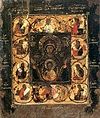

| Previous day | Next day |
| Old Style
March 8
|
Thursday |
New Style
March 21
|
|
1st Week of Great Lent.
Tone 8.
Great Lent. |
Monastic rule: xerophagy (bread, uncooked fruits and vegetables).
|
![]() St. Theophylactus, bishop of Nicomedia (842-845).
St. Theophylactus, bishop of Nicomedia (842-845).
Apostle Hermas of the Seventy (1st c.). Hieromartyr Theodoretus, priest, of Antioch (361-363). Sts. Lazarus, founder (1391) and Athanasius, monk (15th c.), of Murmansk Monastery (Karelia). St. Andronicus (Lukash), schema-archimandrite of Tbilisi, Georgia, elder of Glinsk Monastery (1974).
“Kursk Root” Icon of the Sign of the Most Holy Theotokos (1898).
St. Senan of Scattery Island, monastic founder (ca. 544). St. Felix of Burgundy, bishop of Dunwich and enlightener of East Anglia (ca. 648). Martyrs Quintilian and Capatolinus, at Nicomedia. St. Julian, archbishop of Toledo (690). St. Paul the Confessor, bishop of Plousias in Bithynia (ca. 840). St. Tarasius the Wonderworker, of Lycaonia.
Repose of Blessed Basiliscus of Uglich (1863) and Archbishop Vitaly (Maximenko) of Eastern America (1960).
Thoughts for Each Day of the Year
According to the Daily Church Readings from the Word of God
By St. Theophan the Recluse

Thursday.
Fear the Lord, and depart from evil (Prov. 3:7). Set this as the goal of your preparation for Holy Communion, so that at the end of this preparation the fear of God will dwell in you, and a firm intention to avoid every evil will take root, even if you should have to lose everything, including your life, in order to do so. Do not limit yourself to an external routine of preparation alone, but focus in particular on yourself, enter within yourself and examine your views, whether they are in agreement in all things with the true word of God. Examine your inclinations and dispositions, whether they are what the Lord demands of you in the Gospels. Examine your whole life, whether it agrees with God’s commandments in every way. Mourn and hate whatever is offensive to God, and set in your mind never to do it again. If you do this, you will be most wise; but you would most unwise not to do this.
Articles
 Apostle Hermas of the SeventyThe Holy Apostle Hermas of the Seventy was bishop at Philippopolis, and died a martyr in the first century. |
 Hieromartyr Theodoritus of AntiochSaint Theodoritus was a presbyter and keeper of sacred vessels at the cathedral church in Antioch. |
 Venerable Athanasius of MuromSaint Athanasius was igumen at the monastery of Saint Lazarus during the mid-fifteenth century. |
 Icon of the Mother of God “Kursk-Root”The Kursk Root Icon of the Mother of God “Of the Sign” is one of the most ancient icons of the Russian Church. |





